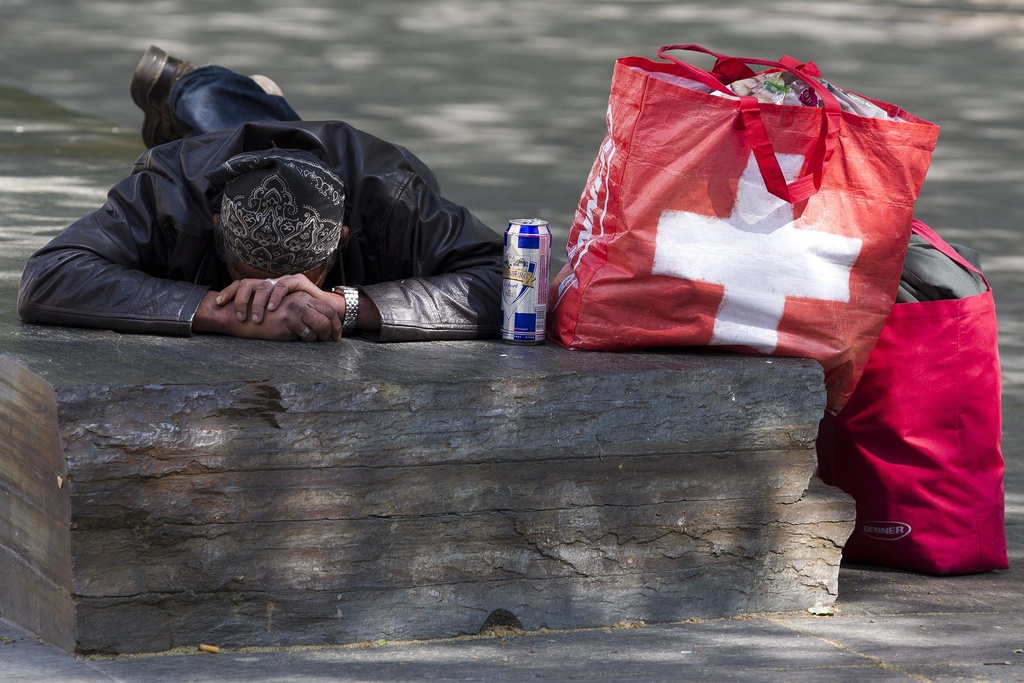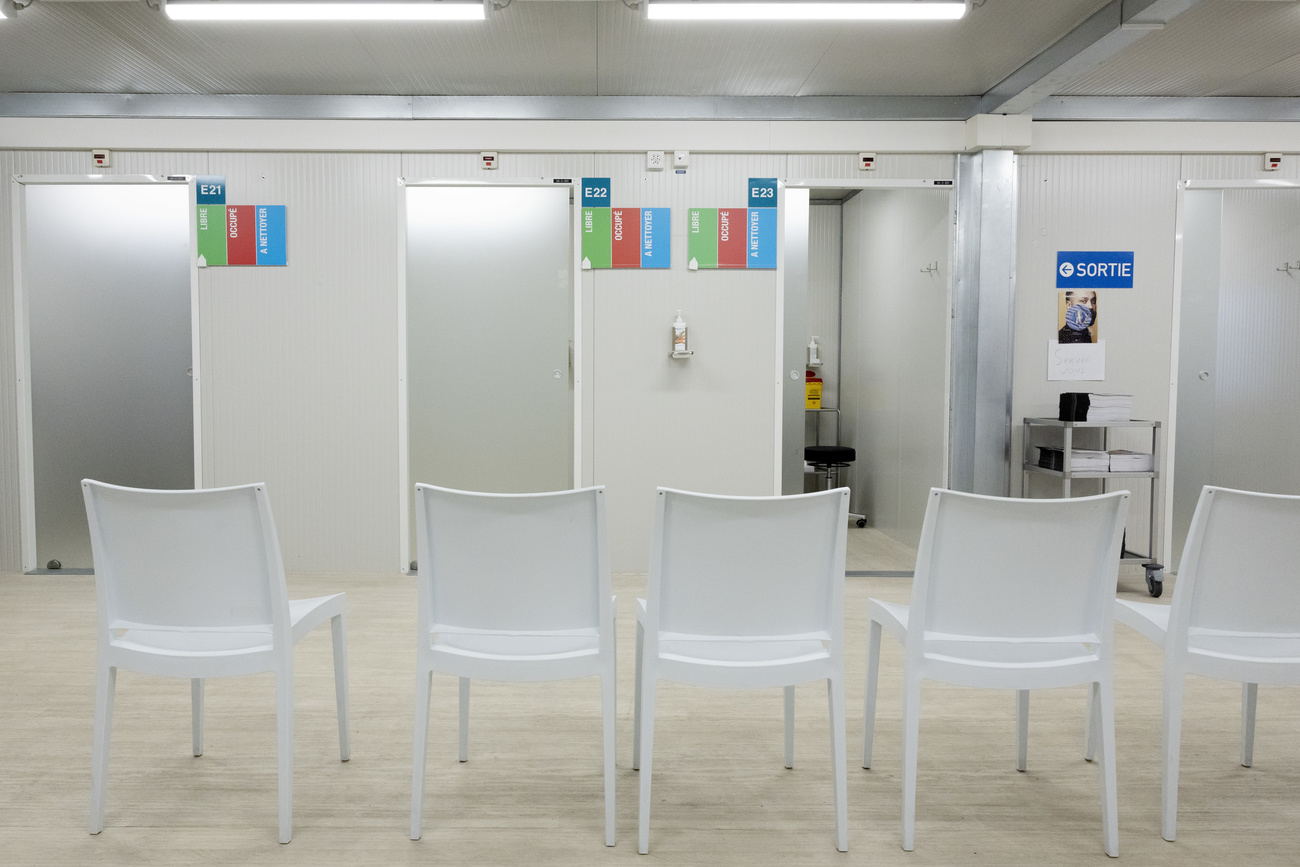
Wealth gap could provoke a social explosion

The rich are getting richer and the poor are getting poorer – and even in Switzerland this could have dangerous consequences, says sociology professor Ueli Mäder.
Mäder, who teaches at Basel University and last year published a study entitled “How the Rich Think and Live”, tells swissinfo.ch that there could be a social explosion unless things change.
Low wages need to be raised and the social insurance system modernised to help make society fairer again, he says.
Mäder has been studying the issues surrounding wealth and poverty for years. swissinfo.ch spoke to him on the sidelines of the conference Poverty and the International Economic Law System, recently held in Basel.
swissinfo.ch: The gap between rich and poor is getting even wider. Why?
Ueli Mäder: Until the 1960s and 70s most people in our part of Europe were able to materially improve their standard of living. But with the slumps of the 70s and 80s things started to change.
I see one reason for this in the fall of the Berlin Wall [in 1989] and the breaking down of the opposition between East and West. Actually that was good news. Unfortunately one consequence was that capital became almost all powerful.
swissinfo.ch: So what changed specifically?
U.M.: The 50s and 60s were a time of political liberalism, which regarded capital and labour as of equal value. But Anglo-Saxon market liberalism brought in a different understanding: since then capital has been accorded much greater importance than labour.
There has never before been a society which has produced so many rich people as ours has. And the saying “For he that hath, to him shall be given” is true in very practical terms for us – via inheritance.
Of the SFr40 billion or so that will be inherited this year, more than half will go to people who are already multi-millionaires – and that just hones the mechanism.
swissinfo.ch: And the achievement-oriented and dog-eats-dog society – doesn’t that play an important role too?
U.M.: Of course. Individual success is measured strongly in terms of money. You have to get your own way, even if you do so at the expense of other people – “The winner takes it all.”
swissinfo.ch: What is new is that poverty is hitting the middle classes more and more …
U.M.: I am very curious to see how the middle class will behave. That’s where you have the greatest job mobility. It’s this mobility which has made it possible for people to increase their income in more than 90 per cent of cases.
There is also a lot of disappointment when someone with a specialist training finds the job market suddenly no longer needs their skills. Such people are particularly easily seduced by fundamentalist or authoritarian movements. We saw this in France in the 1990s, when many middle-class people who felt side-lined voted for the right-wing extremist [Jean-Marie] Le Pen.
Many of those who are angry and indignant applaud populist movements. They look for some kind of security in these rather authoritarian ideas with their stress on law and order. And that means they support a policy that goes against their own interests.
swissinfo.ch: How much wider can the gap grow?
U.M.: Ten years ago we thought it couldn’t get any bigger. Five per cent of individual taxpayers had as much taxable net income as all the rest put together. Last year, in our study “How the Rich Think and Live” we showed that less than three per cent of the population owns more than the remaining 97 per cent. And now the Credit Suisse Global Wealth Study has revealed an even more extreme proportion.
It is quite possible that in the next two or three years the explosive pressure in society could build up even more and even drive people into the streets who are far from being left-wing sympathisers. Increasing numbers of comfortably-off people are saying that if things go on as they are, it will be dangerous for everyone. Something must happen that will help make society fairer again.
swissinfo.ch: How do you imagine that happening?
U.M.: First of all low wages need to be raised and the social insurance system modernised. It has got out of step with changes in the way people live.
If you simply reduce the “working poor” to individuals who have a job and are employed for at least four and a half days a week, that plays down the impact of poverty. It means the [Federal] Statistics Office can say there are fewer than 150,000 poor people in Switzerland.
But these people have children, other people in their households, which more than doubles the figure. And single mothers often don’t have jobs which employ them for 90 per cent of the time, so they are not included in the statistics as working poor. This is just hiding your head in the sand. After all, things go well for society when they are going well for everyone.
At the moment Swiss banks are hoarding more than SFr4000 billion ($4445 billion). That is about six times as much as the entire gross domestic product, in other words the entire wealth generated in the space of a year.
There’s more than enough money about. But there’s a lack of political will about taxing
swissinfo.ch: Do you believe the world is able to change in the direction you would like?
U.M.: Sometimes I actually wonder why I am still so hopeful. At the moment it is most likely that social differences are likely to get worse.
But I also think it is possible that we are capable of introducing corrections. Human beings are capable of learning. And many people are getting involved in new social movements. I can’t say whether that will do the job. But I simply don’t see any alternative to trying it.
The fortunes of the 300 most wealthy people living in Switzerland increased by SFr21 billion ($23.9 billion) in 2010.
Their total wealth amounted to SFr470 billion, according to annual figures published by the economics magazine Bilanz and its French-language partner Bilan in December 2010.
Leading the ranking for the ninth consecutive year was the Swedish founder of the Ikea furniture empire, Ingvar Kamprad. His wealth was an estimated SFr35-SFr36 billion.
In second place came the Hoffmann and Oeri families who have a majority shareholding in the Basel-based Roche pharmaceuticals company. Their wealth was put at SFr13-14 billion.
The number of residents possessing more than SFr1 billion rose slightly from 127 to 135.
Born 1951 in Beinwil am See in canton Aargau.
Studied sociology, psychology and philosophy at Basel University.
Joined the teaching staff of the University of Applied Sciences and Arts of Northwestern Switzerland in 1991.
After completing his post-doctoral thesis in 1998, he taught at Basel University, where he has been professor of sociology at since 2005.
His main specialisation areas are social inequality and conflict and cooperation studies.
He sat in the cantonal parliament of the half-canton of Basel City for several years as a member of the left-wing green party, BastA.
(Translated from German by Julia Slater)

In compliance with the JTI standards
More: SWI swissinfo.ch certified by the Journalism Trust Initiative











































You can find an overview of ongoing debates with our journalists here . Please join us!
If you want to start a conversation about a topic raised in this article or want to report factual errors, email us at english@swissinfo.ch.